名词的词形变化
八年级词形变化汇总
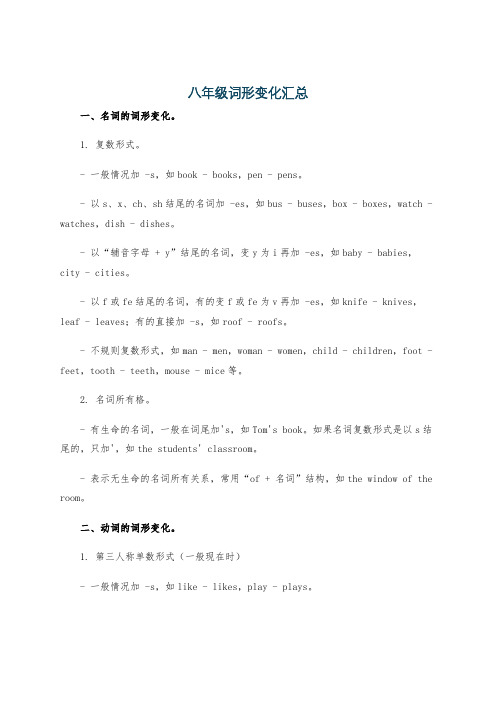
八年级词形变化汇总一、名词的词形变化。
1. 复数形式。
- 一般情况加 -s,如book - books,pen - pens。
- 以s、x、ch、sh结尾的名词加 -es,如bus - buses,box - boxes,watch - watches,dish - dishes。
- 以“辅音字母 + y”结尾的名词,变y为i再加 -es,如baby - babies,city - cities。
- 以f或fe结尾的名词,有的变f或fe为v再加 -es,如knife - knives,leaf - leaves;有的直接加 -s,如roof - roofs。
- 不规则复数形式,如man - men,woman - women,child - children,foot - feet,tooth - teeth,mouse - mice等。
2. 名词所有格。
- 有生命的名词,一般在词尾加's,如Tom's book。
如果名词复数形式是以s结尾的,只加',如the students' classroom。
- 表示无生命的名词所有关系,常用“of + 名词”结构,如the window of the room。
二、动词的词形变化。
1. 第三人称单数形式(一般现在时)- 一般情况加 -s,如like - likes,play - plays。
- 以s、x、ch、sh、o结尾的动词加 -es,如go - goes,do - does,watch - watches。
- 以“辅音字母 + y”结尾的动词,变y为i再加 -es,如study - studies。
2. 动词的 -ing形式(现在分词)- 一般情况加 -ing,如read - reading,write - writing。
- 以不发音的e结尾的动词,去e加 -ing,如make - making,take - taking。
英语单词词性转换的基本规律
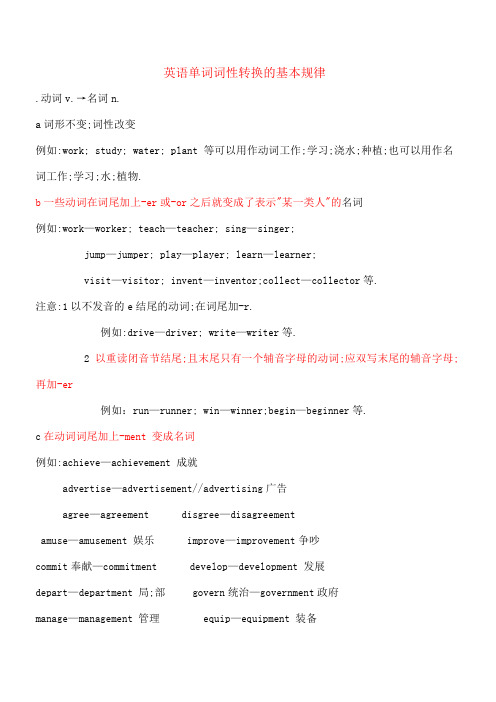
英语单词词性转换的基本规律.动词v.→名词n.a词形不变;词性改变例如:work; study; water; plant等可以用作动词工作;学习;浇水;种植;也可以用作名词工作;学习;水;植物.b一些动词在词尾加上-er或-or之后就变成了表示"某一类人"的名词例如:work—worker; teach—teacher; sing—singer;jump—jumper; play—player; learn—learner;visit—visitor; invent—inventor;collect—collector等.注意:1以不发音的e结尾的动词;在词尾加-r.例如:drive—driver; write—writer等.2以重读闭音节结尾;且末尾只有一个辅音字母的动词;应双写末尾的辅音字母;再加-er例如:run—runner; win—winner;begin—beginner等.c在动词词尾加上-ment 变成名词例如:achieve—achievement 成就advertise—advertisement//advertising广告agree—agreement disgree—disagreementamuse—amusement 娱乐 improve—improvement争吵commit奉献—commitment develop—development 发展depart—department 局;部 govern统治—government政府manage—management 管理 equip—equipment 装备有些单词比较特殊;需把动词后的e去掉再加ment.例如:argue—argument争论d在动词词尾加上-tion/sion变成名词例如: attract—attraction; instruct—instruction;invent—invention discuss—discussion;express—expression educate—education;graduate—graduation; operate—operation 去e再加"ion"compete—competition; organize—organization 把e改成其他字母再加"tion" decide—decision conclude—conclusion 把de改为s再加"ion"describe—description描写;描绘这是特例;不规则变化e在动词词尾加上-ance变成名词例如: appear—appearance 外貌;出现perform—performance 演出accept—acceptance 接受f在动词词尾加-ing变成名词方法与动词变为现在分词的方法相同例如:meet—meeting build—building wait—waiting bathe—bathing say—saying谚语 mean—meaningend —ending train —training wash—washing注意:以重读闭音节结尾;且末尾只有一个辅音字母的动词;应双写末尾的辅音字母;再加-ing如:swim—swimming shop—shopping begin—beginningg其他一些比较特殊的变化例如: Beg乞讨—beggar乞丐 behave行为举止—behaviorknow知道—knowledge知识 fly—flight 飞行heat 加热—heat热量 hit 撞击—hit 轰动一时的人或物;碰撞mix 混合—mixture混合物 press按;压—pressure压力sit坐—seat 座位 succeed—success成功tour—tour旅游/ tourist 游客2.动词v.→形容词adj.a动词后面加able;以e结尾的动词则去e加able;表示具有此性质;特点或属性.例如: afford-affordable;love-lovableb动词后面加ed;以e结尾的动词则直接加d;表示被动性的属性或特点.例如: scatter-scattered use-usedc不规则的动词则必须记忆;记住其过去分词形式.规律不大;意义同b.3.名词n.→形容词adj.a在名词后面加-y可以变成形容词尤其是一些与天气有关的名词例如: rain—rainy; cloud—cloudy; wind—windy; snow—snowy;health—healthy; luck—lucky;anger—angry guilt—guilty内疚的tourist—touristy游客多的 ; salt 盐—salty 咸的silk丝绸—silky丝绸般的; sleep—sleepy 昏昏欲睡的注意:1如果以重读闭音节结尾;且词尾只有一个辅音字母;这时应双写辅音字母再加"-y".如: sun—sunny; fun—funny; fog—foggy有雾的; fur—furry毛皮的2少数以不发音的e结尾的名词变为形容词时;应去掉e再加"-y".如: noise—noisy; ice—icy; shine—shiny发亮的; taste口味—tasty甜的b名词后面加-ed;以e结尾的直接加d.例如: spot斑点—spotted有斑点的; talent—talented 有天赋的organize—organized 有组织的; balance—balanced平衡的c一些抽象名词在词尾加-ful可以变为形容词例如:care—careful; thank—thankful; help—helpful;use—useful; meaning—meaningfuld在名词后加-less构成含有否定意义的形容词例如:care—careless粗心的; use—useless无用的hope—hopeless没希望的;home—homeless无家可归的e一些以-ce结尾的名词;把-ce改为-t变成形容词例如: difference—different; silence—silent; confidence—confidentf.在名词后加-ly变为形容词例如: friend—friendly; love—lovely; live---livelyg.在名词后加-ous变为形容词例如: danger—dangeroush名词后面加-al变为形容词例如: music—musical; medicine—medical 这个比较特殊i名词后面加-able变为形容词;如果以e结尾就去e再加"-able".例如: adjust—adjustable 可调整的 value—valuable有价值的j名词后面加-en变成形容词例如: wood—wooden 木制的 wool—woolen 羊毛的k一些表示国家的名词可以在词尾加-ese; -ish或-n构成表示国籍;语言的形容词例如:China—Chinese; Japan—Japanese; England—English;America—American; India—Indian; Australia —Australian 注意Canada—Canadian4..形容词adj.→副词adv.▲一般在形容词的词尾加-ly可以变成副词例如: quick—quickly; slow—slowly; loud—loudly; sudden—suddenly 等但是;以下几点值得注意:a 一些以"辅音字母+y"结尾的形容词;要把y改为i再加-ly例如: happy—happily; angry—angrily; lucky—luckily; heavy—heavily; noisy—noisilyb 有些以-ble或-le结尾的形容词;去掉e加-y例如:possible—possibly; terrible—terriblyc少数以e结尾的形容词;要去掉e再加-ly例如: true—truly但绝大多数以e结尾的形容词仍然直接加-ly 例如: polite—politely; wide—widely d以-l结尾的形容词变为副词时要在词尾加-ly;以-ll结尾的才在词尾只加-y.例如: usual—usually; careful—carefully; useful—usefullyfull—fully 以-ll结尾的才只加yOK;以上就是英语单词词性变化的一般规律;希望对大家有所帮助PS:有些同学可能对元音辅音以及重读闭音节不是很了解;那我在这里再做下补充说明. 1.英语26个字母中;a e i o u是元音字母; y是半元音字母; 其余都是辅音字母.★所谓半元音就是有时候做元音;有时候做辅音.半元音字母y做元音有: shy;sky做辅音比如最简单的:yes2.开音节和闭音节开音节分两种:绝对开音节和相对开音节绝对开音节指的是"元音字母结尾"的音节例如 we; hi等相对开音节是指"辅音字母-元音字母-辅音字母-不发音的e"的音节;r除外. 例如;take;make等比如:take 在这个单词中;t是辅音;a是元音;k是辅音;e是不发音的元音◆在开音节中; 元音字母发他们在字母表中的音闭音节; 则是指"辅音字母-元音字母-辅音字母"的音节 -al等除外例如:leg;cross 等◆在闭音节中;元音字母发不同的音a e i o u例 sat let sit not nut 试着读下这些单词;这些单词中;元音发的音都不是它们在字母表中发的音2.英语重读闭音节就是以辅音因素结尾的;而且是重读音节的音节.比如apple 划音节就因该是ap/ple 前面那个ap是一个音节;这个音节以辅音因素p结尾;所以就是闭音节.仅仅能看出是闭音节;是不是重读闭音节还要看这个音节是不是重读的重读闭音节三要素:1. 必须是重读音节;2. 最后只有一个辅音字母;3.元音字母发短元音说通俗点;打个比方; /u/是短元音;/u:/是长元音重读闭音节即两个辅音中间夹一个元音.如:sit---sitting begin---beginning重读在gin这个音节上●像travel这个单词;"vel"也是"辅音+元音+辅音"的结构;但是重音不在vel这个音节上;所以不用双写"l";可以为travelled;也可以是traveled;更常用的是后者.。
各类词形的变化方式
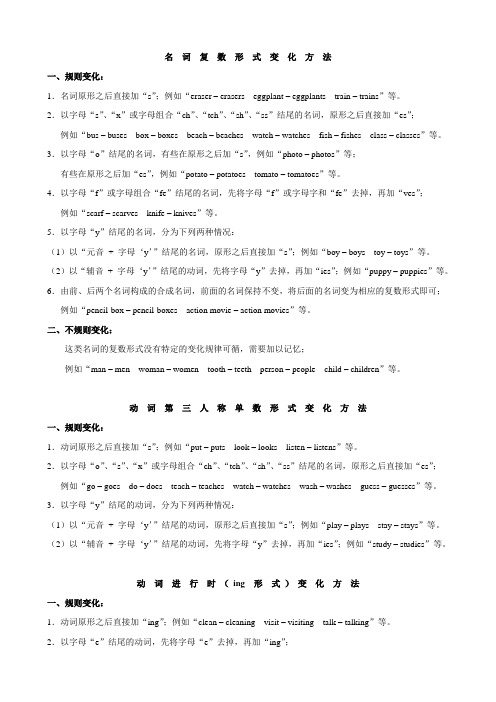
名词复数形式变化方法一、规则变化:1.名词原形之后直接加“s”;例如“eraser – erasers eggplant – eggplants train – trains”等。
2.以字母“s”、“x”或字母组合“ch”、“tch”、“sh”、“ss”结尾的名词,原形之后直接加“es”;例如“bus – buses box – boxes beach – beaches watch – watches fish – fishes class – classes”等。
3.以字母“o”结尾的名词,有些在原形之后加“s”,例如“photo – photos”等;有些在原形之后加“es”,例如“potato – potatoes tomato – tomatoes”等。
4.以字母“f”或字母组合“fe”结尾的名词,先将字母“f”或字母字和“fe”去掉,再加“ves”;例如“scarf – scarves knife – knives”等。
5.以字母“y”结尾的名词,分为下列两种情况:(1)以“元音+ 字母‘y’”结尾的名词,原形之后直接加“s”;例如“boy – boys toy – toys”等。
(2)以“辅音+ 字母‘y’”结尾的动词,先将字母“y”去掉,再加“ies”;例如“puppy – puppies”等。
6.由前、后两个名词构成的合成名词,前面的名词保持不变,将后面的名词变为相应的复数形式即可;例如“pencil-box – pencil-boxes action movie – action movies”等。
二、不规则变化:这类名词的复数形式没有特定的变化规律可循,需要加以记忆;例如“man – men woman – women tooth – teeth person – people child – children”等。
动词第三人称单数形式变化方法一、规则变化:1.动词原形之后直接加“s”;例如“put – puts look – looks listen – listens”等。
各种词形变化

一.名词变复数1.一般情况在词尾加s map maps, sea seas, girl girls, day days2.以x,s,ch,sh 结尾的名词后加es class classes, box boxes,watch watches, dish dishes3. 以f或fe结尾的词变f和fe为ves leaf leaves, knife knives, wife wives加s belief beliefs, chief chiefs, proof proofs, roof roofs, gulf gulfs4.以辅音字母加y结尾的名词,变y为i加es party parties, family families, story stories5.以元音字母加y结尾的名词,加s toy toys, boy boys, day days, ray rays6.以辅音字母加o结尾的名词加es hero--heroes, potato--potatoes, tomato--tomatoes一些外来词,音译词加s piano---pianos,photo--photos,kilo--kilos,vedio--vedios 7以元音字母加o结尾的名词s radio---radios,bamboo---bamboos, zoo---zoos表示哪国人1.加s Americans, Australians, Germans, Greeks, Swedes, Europeans2.单复数同形Swiss瑞士人, Chinese, Japanese3.以man或woman结尾的改为men,women Englishmen, Frenchwomen合成名词1. 将主体名词变为复数son s–in-- law, looker s---on, passer s---by, storyteller s,2. 无主体名词时将最后一部分变为复数grown--ups,house--wives,3. 将两部分变为复数women singers, men servants通常作不可数名词的词information信息;advice忠告,建议;progress进步,进展;weather天气;fun乐趣,快乐;equipment设备;furniture家具;wealth财富;damage损坏;traffic交通,车辆及行人;baggage/luggage行李;work工作;homework家庭作业;housework家务;luck运气;cake蛋糕,news 新闻二.形容词变副词1.直接+ly free---freely; 注意:full---fully2. 以—le 结尾的形容词去e + yterrible —terribly ;possible—possibly ; comfortable--comfortably3.其它以e结尾的形容词直接+ly fortunate—fortunately;immediate—immediately注意:true—truly whole—wholy4.以辅音+y结尾的,去y 为i+ly happy—happily ;easy—easily ;angry—angrily注意:dry—dryly shy—shyly4. 以ic结尾的+ally energetic—energetically automatic—automatically scientific—scientifically basic—basically注意:public— publicly三.形容词,副词的比较级,最高级1 一般在形容词、副词后加上er表示比较级加上est表示最高级2 以不发音的e结尾的,只加上r表示比较级,加上st表示最高级。
词形变化归纳

中考英语复习词形归纳一、名词的复数形式构成:1.以-f或-fe结尾的名词变复数(1)加-s,如:cafes, giraffes(2)去f,fe加-ves,如:half-halves knife-knives leaf-leaves life-lives wolf-wolvesthief-thieves self-selves wife-wives shelf-shelves歌诀记忆:树叶(leaf)半数(half)自己(self)黄;妻子(wife)拿刀(knife)去割粮;架(shelf)后窜出一匹狼(wolf);就像小偷(thief)逃命(life)亡。
这9个名词变复数时,都要改-f(e)为v,再加-es,2.以-o结尾的名词,变复数(1)加s,如:photo-photos piano-pianos radio-radios zoo-zoos kilo-kilos (2)加es,如:potato-potatoes tomato-tomatoes mangoes, Negro-Negroes hero-heroes歌诀记忆:黑人(Negro)和英雄(hero)爱吃芒果、西红柿(tomato)和马铃薯(potato)。
除了这五个以-o结尾的名词加-es外,其余的以-o结尾的名词加-s。
3.表示―国家‖的名词变复数Chinese-Chinese Japanese-Japanese Englishman-Englishmen Frenchman-Frenchmen Russian-Russians Indian-Indians Canadian-Canadians American-Americans歌诀记忆:中(Chinese)日(Japanese)不变,英(Englishman)法(Frenchman)变,其余s加后面。
4.以复数形式出现的名词goods货物trousers/pants /jeans /shorts裤子clothes衣服glasses眼镜5.以s结尾,仍为单数的名词(1)maths,politics,physics等学科名词,为不可数名词,是单数。
词性变化

一、名词变形容词(n.- adj.)1. 在名词后面加-y可以变成形容词(尤其是一些与天气有关的名词)。
例如:rain—rainy, cloud—cloudy, wind—windy, snow—snowy等。
1)如果名词以重读闭音节结尾,且词尾只有一个辅音字母,这时应双写词尾的辅音字母再加-y。
如:sun—sunny, fun—funny等。
2)少数以不发音的e结尾的名词变为形容词时,应去掉e再加-y。
例如:noise—noisy, ice—icy 等。
2. 一些抽象名词在词尾加-ful可以变为形容词。
例如:care—careful, thank—thankful, help—helpful, use—useful,beauty—beautiful等。
3. 一些表示国家的名词可以在词尾加-ese, -ish或-n构成表示国籍、语言的形容词。
例如:China—Chinese, England—English, America—American, India—Indian (其中注意Canada—Canadian)。
4.在名词后加-ous变为形容词。
例如:danger—dangerous等。
5. 在名词后加-ly变为形容词。
例如:friend—friendly, love—lovely等。
6.在名词后加-less构成含有否定意义的形容词。
例如:care—careless,use—useless,hope—hopeless,home—homeless等。
7. 一些以-ence结尾的名词,把ence改为ent变成形容词。
例如:difference—different, silence—silent等。
二、动词变名词(v.-n.)1.词形不变,词性改变。
例如:work, study, water, plant等可以用作动词,也可以用作名词。
2. 一些动词在词尾加上-er或-or之后就变成了表示“某一类人”的名词。
(完整版)名词单数变复数变化规则

名词单数变复数变化规则:1.一般名词复数是在名词后面加上“s”,如map→maps,bag→bags,book-books 等;2.以s,x,sh,ch结尾的词加“es”,如bus→buses,watch→watches, box-boxes 等;3.以f或fe结尾的名词变复数时,去掉f,fe 加ves的名词有:half→halves knife →knives leaf→leaves wolf→wolves wife→wives life→lives thief→thieves 4.以o 结尾的名词变复数时:a)加s的名词有(无生命):photo→photos ,piano→pianos,radio→radios b)加es的名词有(有生命):potato→potatoes tomato→tomatoes5.以辅音字母+y结尾的词,变y为i加es,如baby→babies, family-families, study-studies等;以元音字母+y结尾的名词变复数时,直接加s变复数,如monkey→monkeys,holiday→holidays,storey→storeys(楼层);6. oo变ee的单词:foot-feet, goose-geese,tooth-teeth;7. a变e的单词:man-men, woman-women, policeman-policemen;8. 复数与原形一致的单词:fish-fish, sheep-sheep, deer-deer, Chinese-Chinese, Japanese-Japanese;9.最特殊的一个:German-Germans.名词单数变复数的练习题一、写出下列名词的复数形式1、orange__________2、class ___________3、monkey__________4、piano___________5、child ___________6、shelf ____________7、bed____________8、country__________9、family___________10、toy__________ 11、foot __________ 12、radio__________13、photo__________ 14、tomato___________ 15、woman___________16、knife________17、sheep__________18、ship__________ 19、dish___________ 20、mouse___________二、用所给的单词的复数的正确形式填空:1> There are three_____________(chair) in the classroom.2> These_____________ (tomato) are red.3> My brother looks after two_____________ (baby)4> My father likes to eat_____________ (potato).5> Chinese_____________ (people)like to eat noodles.6> I have a lot of _____________ (toy) in my bedroom.7> My mother wash_____________ (dish) in the kitchen.8> I have two_____________ (pencil-box).9> There are some_____________ (bus)in the street.10> Monster has eight_____________ (foot).三、选择填空( )1.I can see three ________ in the zoo. A monkeys B monkeys C monkey ( )2. The pig has four ________. A. foot B. feet C. foots( )3. My two brothers are ________. A. policeman B. policemans C. policemen ( )4. I can see ten _____ in the picture. A. sheep B. dog C. pig( )5. The _____ has three_____. A. boys, watches B. boy, watch C. boy, watches ( )6. Can you see _______on the plate? A. bread B. breads C. breades( )7. The girl often brushes her_____ before she goes to bed. A. tooth B. tooths C. teeth ( )8. Mr Black often drink some _________. A. milk B. milks kes( )9. There are some _____on the floor. A. child B. man C. books( )10. Lucy will has some _______. A. photo B. photos C. photoes( )11. I am drinking two ________. A. cups of water B. cup of water C. cups of water s ( )12. The cat eats two _______ on Monday. A. mouses B. mice C. mouse( )13. I need a pen and some _____. A. books B. desk C. chair( )14. There are______ in the room. A. photos B. photoes C. photo( )15. There is some _____ in the river. A. fish B. fishes C. fishs( )16. There___ two ___in the box. A. is watch B. are watches C. are watch( )17. We have to clean ___ every day. A.our tooth B. our tooths C. our teeth( )18. My _____ room is next to the reading room.A.teacherB.teacher’sC.teachers( )19.Tom and Jim are ______. A.friends B.friend C.brother( )20.How many_____do they have? A.picture B.pictures C.a picture 四写出下列名词的复数形式。
名词的词形变化
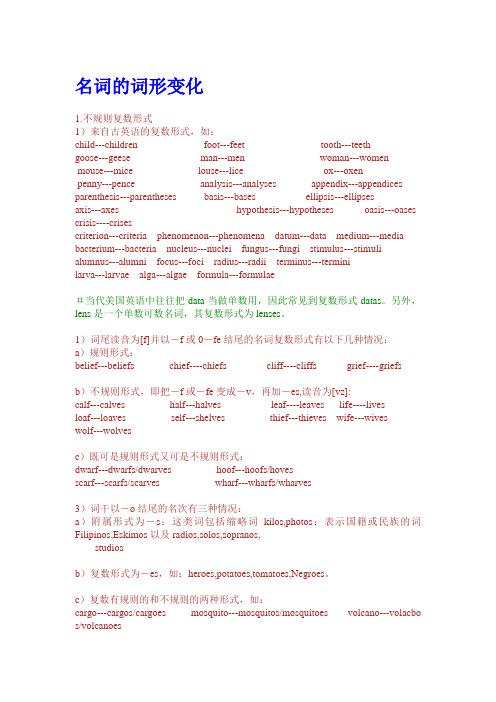
名词的词形变化1.不规则复数形式1)来自古英语的复数形式,如:child---children foot---feet tooth---teethgoose---geese man---men woman---womenmouse---mice louse---lice ox---oxenpenny---pence analysis---analyses appendix---appendices parenthesis---parentheses basis---bases ellipsis---ellipsesaxis---axes hypothesis---hypotheses oasis---oases crisis----crisescriterion---criteria phenomenon---phenomena datum---data medium---media bacterium---bacteria nucleus---nuclei fungus---fungi stimulus---stimuli alumnus---alumni focus---foci radius---radii terminus---terminilarva---larvae alga---algae formula---formulae#当代美国英语中往往把data当做单数用,因此常见到复数形式datas。
另外,lens是一个单数可数名词,其复数形式为lenses。
1)词尾读音为[f]并以-f或0-fe结尾的名词复数形式有以下几种情况:a)规则形式:belief---beliefs chief----chiefs cliff----cliffs grief----griefsb)不规则形式,即把-f或-fe变成-v,再加-es,读音为[vz]:calf---calves half---halves leaf----leaves life----livesloaf---loaves self---shelves thief---thieves wife---wiveswolf---wolvesc)既可是规则形式又可是不规则形式:dwarf---dwarfs/dwarves hoof---hoofs/hovesscarf---scarfs/scarves wharf---wharfs/wharves3)词干以-o结尾的名次有三种情况:a)附属形式为-s:这类词包括缩略词kilos,photos;表示国籍或民族的词Filipinos,Eskimos以及radios,solos,sopranos,studiosb)复数形式为-es,如:heroes,potatoes,tomatoes,Negroes。
专题(名词)

名词-----学好语法的基础₰名词的单复数+-s 以-s ,-x ,-ch ,-sh 结尾的名词+ --es第一个或最后一个词变复数10分钟1.语法填空单句训练1. After the event the (piano) are donated to local schools and community groups.2. College students are (grown-up) and it's their rights to choose the way to live.3. The (roof) of these cottages were covered with (leaf).4. He asked me a lot of (question) .5. Several (boy) went to help him in the afternoon.6. There are many interesting (story) in the book.7. The two (class) are planting trees in the field.8. McDonald's is one of the best-known (restaurant) in the U.S. and even the world.9. They have different (idea)about life,work and play.10. In the meanwhile,it causes a series of (problem) .2.短文改错单句训练1.I’m very glad to have received the letter you sent me tow week ago.2.First, we can go to Qingdao, where it is cool and mild,have funs at the seaside.3.They were delighted to receive these gift.4.I like making friend with people and I do my best to get on well with everyone.5.We couldn't help taking lots of wonderful photo.6.In fact,I know that a few big company in our city are hoping to hire people like you.7.As I ran out to catch them, big drop of rain began to fall.8.Luckily, the water didn't reach any of the house in our village.9.There are various way to get relaxed for middle school students.10.We offered our congratulation on his winning the first prize.建议用时15分钟1.语法填空(侧重训练名词复数)New York City is one of the world's greatest 1 (city) for walking in. All five 2 (district) can be explored on foot, but Manhattan is possibly the easiest and most popular for pedestrians.Manhattan is easiest for all 3 (visitor) because all streets north of Houston Street are laid out in a numbered grid(方格)pattern. Streets run from east to west and avenues going from north to south. Twenty “street” blocks(e.g. 40th St. to 60th St.) usually takes 20 to 30 4 (minute) to walk.Walking is best for people 5 want to see all the details---the buildings,the people,and the street life. If you walk around New York City,there is a good chance that you will walk past movie 6 (star) but you might not notice them. If you are going to walk,and you don't want to get 7(lose) , ask local people for help. Most New Yorkers love giving 8 ( direct). Tell them where you want to go,and they will gladly help you. But they are always 9 a hurry! Don't take it personally if they just say,“3 blocks that way"and keep 10 (walk).1. 2. 3. 4. 5. 6. 7. 8. 9. 10.2.短文改错(侧重训练名词复数)Dear John,I’ve finally made up my minds to go to America for further study after graduation.It has always been my dreams to experience America culture,which is known it’s diversity and liveliness.But to tell you the truth,I have some worries too.I didn’t have a good command of English,especially spoken English .So I’m afraid I will have difficulties fitting in.Moreover,I’m not sure whether I can handle the pressure from course and fellows or not.With so many thing troubling me,I hope you can offer me some advices.Looking forward to your reply.Yours,Li ming₰名词词形变化:形容词或动词转换为名词I.语法填空单句训练1.She apologized to me for her rude ( behave)toward me.2.My (suggest) is that we should always have a Chinese-English dictionary within easy reach.3.In (real),he comes from Africa.4.They have changed the (appear) of the whole house.5.They need someone to talk with and share their sorrow and (happy) .6.Doctors thought she had little chance of (survive).7.The scientists have just discovered a new method to cure the (ill).8.The Buckingham Palace is a great tourist(游客,游客的、旅游的)(attract) ,drawing millions of visitors every year.9.Kids need this kind of (protect) and help.10.However,the worst (impress)is that I was feeling hungry all the time.11.Always read the (instruct)on the bottle carefully and take the right amount of medicine.12.I could tell he was surprised from the (express)on his face.Ⅱ短文改错单句训练1.This is the ideal place for you to make more friends, to experience the excitement of discover,and to keep fit.2.Sorry again for any inconvenience caused by my absent.3.Our class had a discuss about the research.4.You should pay more attention to your healthy.5.It is agreed that honest is the best policy.建议用时15分钟1.语法填空(侧重训练名词复数)AMaking friends is an art. The core(核心)of it is a kind and genuine heart. Apart from this big secret,here are some other 1 (suggest) .First,learn to smile-wearinga smile makes one easy to approach. People like to make 2 (friend) with such a person. Besides, smiles also help one gain 3 (confident) .Being a good 4 (listen) and talker is the second golden rule.Paying attention 5 what others say makes them feel important,and everyone would love to have this kind of self-respect. Meanwhile,you need to play your part in the conversation. The key is to learn when to talk; don't make the others feel they have 6 (difficult) getting a word in. The essence of this rule is to keep a 7 (balanced) between giving and taking in friendship. 8 (modest) enables a person to move from being the centre of attention to focusing on the needs of others.9 (final) ,learn to see some positive 10 (quality) in others; don't ever try to tear someone down.People usually light up when hearing a sincere and positive comment. This strengthens friendship as well as the spirit.1. 2.3. 4.5. 6.7. 8.9. 10.BI am 25 years old now and I think in my early life there (be )much time when I had to suffer from a lot of bitterness,(disappoint)and hardship.I lost both parents at 14,so I had no (choose) but to accept the difficult situation where I was placed. I had the (responsible) of caring for my granny and my younger sister with epilepsy(癫痫).With a positive attitude life and studies, I was able (finish) my schooling with excellent results. At 21,I bought my first house in the capital city Lusaka of Zambia and had my own place to live in. At 23,I bought my first car. Today,at 25,I have worked for over 5 local and international (organization) with current assignment being working in the United Nations. I plan to finish my year with a happy (marry)for my own family life.There is no telling what happens to someone in his or her life. People have adifferent (fortunate.)But one thing is the same: One needs (confident) and trust in what they believe is right. My story has just begun,and the best is yet to come.₰名词的格与名词的固定搭配一.名词的格二.名词的固定搭配Ⅰ.短文改错单句训练1.I was playing at my cousin house.2.When I finally arrived at my friend he lent me lots of clothes.3.After a five-hour‘s drive,we reached the small village at last.4.Jane and Tom’s mothers are discussing a problem.5.Most of students preferred to make an independent choices.6.I first met Li Ming at a friend birthday party five years ago.7.I often read English aloud and try to learn something important by hearts.8.I usually come home,have something to eat,do two hour’s homework and then goto the swimming pool.Ⅱ.语法填空单句训练1.I can't find the key the door.Have you seen it?2. I have to look after this baby of my (aunt).3. I felt not well so I went to the (doctor) .4. It doesn't make any (different)to me whether you‘ll come or not.5.The meeting finally come to a(n) at 9 o’clock.6.The cloud flooded in all (direct).7.I have been taking (pains)to complete my task on time.8.The students are busy making (prepare)for the exams.9. We set out to climb the high mountain in high (spirit) .单项选择(共10道题)1.(2015福建,24)The failure was a big______to him,but he wasn’t discouraged and soon got as enthusiastic as ever.A.blowB.issueC.excuseD.factor2.(2015安徽,30)There is no need to tell me your answer now.Give it some______ and then let me know.A.thoughtB.supportC.protectionD.authority3.(2015湖北,22)He gave himself a new name to hide his______when he went to carry out the secret task.A.emotionB.talentC.identityD.treasure4.(2015湖北,21)When he was running after his brother,the boy lost his______and had a bad fall.A.balanceB.chanceC.memoryD.place5.(2015江苏,35)—Go and say sorry to your Mom,Dave.—I’d like to,but I’m afraid she won’t be happy with my______.A.requestsB.excusesC.apologiesD.regrets6.(2015江苏,32)Some schools will have to make______in agreement with the national soccer reform.A.judgmentsB.adjustmentsmentsD.achievements7.(2015浙江,15)One of the most effective ways to reduce______is to talk about feelings with someone you trust.A.productionB.stressC.energyD.power8.(2014福建,26,1分)—Could you tell me the______of making such tasty cakes?—Well,I just follow the directions in the cookbook.A.featureB.planC.costD.trick9.(2014湖北,22,1分)When Richard said,“You are much more agreeable and prettier now,”Joan’s face turned red at the unexpected______.A.contributionplimentparisonmand10.(2014湖北,21,1分)Her______for writing was a desire for women to get the right to higher education.A.talentB.motivationC.qualificationD.technique。
英语词形转换(名词单复数与人称代词)

不可遗漏的语法层面的词形转换Group 1名词变复数1.可数名词变复数规则变化2.可数名词变复数不规则变化Group 2代词的变化Group 3形容词/副词变比较级和最高级1.规则变化注意:(1)少部分双音节词是以er,y,ow和le结尾的单词,直接加er,est或者r,st,如:clever,early,yellow,narrow,simple等。
(2)下列形容词没有比较级和最高级(即表示“最高程度”或“绝对状态”的形容词和副词没有比较级和最高级),如:empty;wrong;perfect;unique;extreme;excellent;favourite;true;right;correct等。
2.不规则变化Group 4动词变单数第三人称,过去式/过去分词和现在分词Group 5数词的变化1.基数词2.序数词3.分数参考答案Group 11.books apples companies days monkeys matches brushes months stomachs heroesradios pianos knives chiefs2.feet teeth mice policemen Japanese meansseries childrenGroup 2me myself we ours yourself you yours hisher its itself them theirsGroup 31.taller tallest shorter shortest later latest easier easiest heavier heaviest thinner thinnest bigger biggest more beautiful most beautiful more serious most serious more boring most boring more tired most tired2.better worst more least farther furthest elder oldestGroup 4writes finishes mixes goes cries hopedadmitted carried reading having runningGroup 51.two four six eight ten twelve fourteen fifteen eighteen forty ninety 2.second fourth ninth twelfth ninetieth twentythird3.two thirds two and three fifths。
偏旁部首记单词 名词的词形变化1

of所有格一般用于无生命的名词。
例:the bank of China the key of the door
(3)双重所有格
3、名词所有格
双重所有格的构成为:of+名词所有格。需要注意的是, 在双重所有格的结构中,of后面的名词必须表示是人。
2、不可数名词 milk [mɪlk] 牛奶 music ['mjuːzɪk] 音乐 telephone ['telɪfəʊn] 电话 weather ['weðə] 天气
3、名词所有格
3、名词所有格 (1)'s 所有格 1)一般有生命的名词或者表示时间、距离、城镇、国家、 世界的名词直接在其后加“'s”构成所有格。 例:Lucy's bike, today's newspaper, America's future.
例:a friend of my sister's a book of Lucy's
谢谢聆听
Thnaks
上海乐派思国际教育
秒杀单词2200
上海乐派思国际教育
主讲人:代老师
第一节 名词的词形变化
2、不可数名词
2、不可数名词
chess [tʃes] 国际象棋 coffee ['kɒfɪ] 咖啡
countryside ['kʌntrɪsaɪd] 乡下 litter ['lɪtə] 垃圾
medicine [ˈmedsn] 药
2)以s结尾的名词单复数,所有格直接加“ ' ”。若名词复 数不是以s结尾,其名词所有格加“'s”。 例:the boss' plan, students's bags, children's toys.
英语单词词性转换的基本规律

英语单词词性转换的基本规律英语单词词性转换的基本规律一.动词(v.)→名词(n.)1词形不变,词性改变例如:work, study, water, plant等可以用作动词(工作,学习,浇水,种植),也可以用作名词(工作,学习,水,植物).2一些动词在词尾加上-er或-or之后就变成了表示"某一类人"的名词例如:work—worker, teach—teacher, sing—singer,jump—jumper, play—player, learn—learner,visit—visitor, invent—inventor,collect—collector等.注意:1)以不发音的e结尾的动词,在词尾加-r.例如:drive—driver, write—writer等.2)以重读闭音节结尾,且末尾只有一个辅音字母的动词,应双写末尾的辅音字母,再加-er 例如:run—runner, win—winner,begin—beginner等.3在动词词尾加上-ment 变成名词例如:achieve—achievement (成就) advertise—advertisement//advertising(广告) agree—agreement disgree—disagreementamuse—amusement (娱乐) improve—improvement(争吵)commit(奉献)—commitment develop—development (发展)epart—department (局,部) govern(统治)—government(政府)manage—management (管理) equip—equipment (装备)有些单词比较特殊,需把动词后的e去掉再加ment. 例如:argue—argument(争论) 4在动词词尾加上-(t)ion/(s)ion变成名词例如: attract—attraction; instruct—instruction;invent—invention discuss—discussion; express—expression educate—education; graduate—graduation; operate—operation (去e再加"ion")compete—competition; organize—organization (把e改成其他字母再加"tion") decide—decision conclude—conclusion (把de改为s再加"ion")describe—description描写,描绘 (这是特例,不规则变化)5在动词词尾加上-ance变成名词例如: appear—appearance (外貌;出现) perform—performance (演出) accept—acceptance (接受)6在动词词尾加-ing变成名词 (方法与动词变为现在分词的方法相同)例如:meet—meeting build—building wait—waitingbathe—bathing say—saying(谚语) mean—meaningend —ending train —training wash—washing注意:以重读闭音节结尾,且末尾只有一个辅音字母的动词,应双写末尾的辅音字母,再加-ing 如:swim—swimming shop—shopping begin—beginning7其他一些比较特殊的变化例如: Beg(乞讨)—beggar(乞丐) behave(行为举止)—behaviorknow(知道)—knowledge(知识) fly—flight (飞行)heat (加热)—heat(热量) hit (撞击)—hit( 轰动一时的人或物,碰撞)mix (混合)—mixture(混合物) press(按,压)—pressure(压力)sit(坐)—seat (座位) succeed—success(成功) tour—tour(旅游)/ tourist (游客)1动词后面加able,以e结尾的动词则去e加able,表示具有此性质,特点或属性.例如: afford-affordable;love-lovable2动词后面加ed,以e结尾的动词则直接加d,表示被动性的属性或特点.例如: scatter-scattered use-used2不规则的动词则必须记忆,记住其过去分词形式.规律不大,意义同(b).三.名词(n.)→形容词(adj.)1在名词后面加-y可以变成形容词(尤其是一些与天气有关的名词)例如: rain—rainy, cloud—cloudy, wind—windy, snow—snowy,health—healthy, luck—lucky,anger—angry guilt—guilty(内疚的)tourist—touristy(游客多的) , salt (盐)—salty (咸的)silk(丝绸)—silky(丝绸般的), sleep—sleepy (昏昏欲睡的)注意:1)如果以重读闭音节结尾,且词尾只有一个辅音字母,这时应双写辅音字母再加"-y". 如: sun—sunny, fun—funny, fog—foggy(有雾的), fur—furry(毛皮的)2)少数以不发音的e结尾的名词变为形容词时,应去掉e再加"-y".如: noise—noisy, ice—icy, shine—shiny(发亮的), taste(口味)—tasty(甜的)2名词后面加-ed,以e结尾的直接加d.例如: spot(斑点)—spotted(有斑点的); talent—talented (有天赋的)organize—organized 有组织的; balance—balanced(平衡的)3一些抽象名词在词尾加-ful可以变为形容词例如:care—careful, thank1—thankful, help—helpful, use—useful, meaning—meaningful 4在名词后加-less构成含有否定意义的形容词例如:care—careless(粗心的), use—useless(无用的)hope—hopeless(没希望的),home—homeless(无家可归的)5一些以-ce结尾的名词,把-ce改为-t变成形容词例如: difference—different, silence—silent, confidence—confident6.在名词后加-ly变为形容词例如: friend—friendly, love—lovely, live---lively7.在名词后加-ous变为形容词例如: danger—dangerous8名词后面加-al变为形容词例如: music—musical; medicine—medical (这个比较特殊)9名词后面加-able变为形容词,如果以e结尾就去e再加"-able".例如: adjust—adjustable 可调整的 value—valuable有价值的10名词后面加-en变成形容词例如: wood—wooden 木制的 wool—woolen 羊毛的11一些表示国家的名词可以在词尾加-ese, -ish或-n构成表示国籍,语言的形容词例如:China—Chinese, Japan—Japanese, England—English,America—American, India—Indian, Australia —Australian(注意Canada—Canadian)▲一般在形容词的词尾加-ly可以变成副词例如: quick—quickly, slow—slowly, loud—loudly, sudden—suddenly 等但是,以下几点值得注意:1一些以"辅音字母+y"结尾的形容词,要把y改为i再加-ly例如: happy—happily, angry—angrily, lucky—luckily, heavy—heavily, noisy—noisily 有些以-ble或-le结尾的形容词,去掉e加-y 例如:possible—possibly, terrible—terribly 3少数以e结尾的形容词,要去掉e再加-ly例如: true—truly但绝大多数以e结尾的形容词仍然直接加-ly例如: polite—politely, wide—widely4以-l结尾的形容词变为副词时要在词尾加-ly,以-ll结尾的才在词尾只加-y.例如: usual—usually, careful—carefully, useful—usefullyfull—fully (以-ll结尾的才只加y)PS:有些同学可能对元音辅音以及重读闭音节不是很了解,那我在这里再做下补充说明.1.英语26个字母中,a e i o u是元音字母, y是半元音字母, 其余都是辅音字母.★所谓半元音就是有时候做元音,有时候做辅音.半元音字母y做元音有: shy,sky 做辅音比如最简单的:yes2.开音节和闭音节开音节分两种:绝对开音节和相对开音节绝对开音节指的是"元音字母结尾"的音节 (例如 we, hi等)相对开音节是指"辅音字母-元音字母-辅音字母-不发音的e"的音节,(r除外). ( 例如,take,make等)比如:take (在这个单词中,t是辅音,a是元音,k是辅音,e是不发音的元音)◆在开音节中, 元音字母发他们在字母表中的音闭音节, 则是指"辅音字母-元音字母-辅音字母"的音节 ( -al等除外) (例如:leg,cross等) ◆在闭音节中,元音字母发不同的音 a e i o u例 sat let sit not nut (试着读下这些单词,这些单词中,元音发的音都不是它们在字母表中发的音)2.英语重读闭音节就是以辅音因素结尾的,而且是重读音节的音节.比如apple 划音节就因该是ap/ple 前面那个ap是一个音节,这个音节以辅音因素p结尾, 所以就是闭音节.(仅仅能看出是闭音节,是不是重读闭音节还要看这个音节是不是重读的) 重读闭音节三要素:1. 必须是重读音节;2. 最后只有一个辅音字母;3.元音字母发短元音 ( 说通俗点,打个比方, /u/是短元音,/u:/是长元音)重读闭音节即两个辅音中间夹一个元音.如:sit---sitting begin---beginning(重读在gin这个音节上)●像travel这个单词,"vel"也是"辅音+元音+辅音"的结构,但是重音不在vel这个音节上,所以不用双写"l",可以为travelled,也可以是traveled,更常用的是后者.。
初中英语四大词形变化规律(动词 名词 形容词 副词)
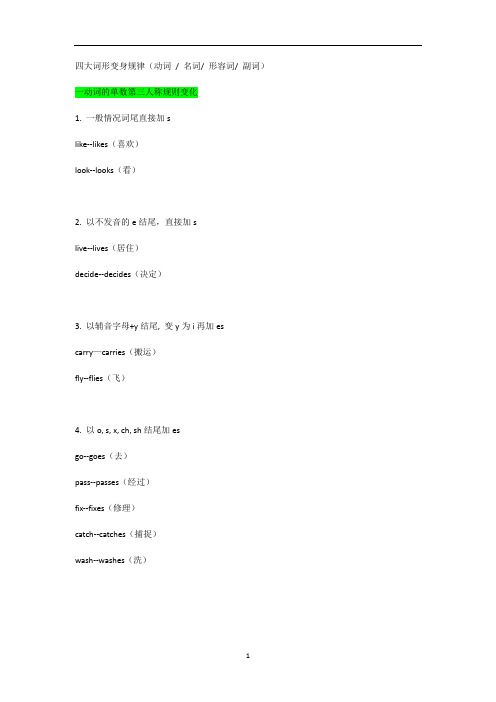
四大词形变身规律(动词/ 名词/ 形容词/ 副词)一动词的单数第三人称规则变化1. 一般情况词尾直接加slike--likes(喜欢)look--looks(看)2. 以不发音的e结尾,直接加slive--lives(居住)decide--decides(决定)3. 以辅音字母+y结尾, 变y为i再加es carry—carries(搬运)fly--flies(飞)4. 以o, s, x, ch, sh结尾加esgo--goes(去)pass--passes(经过)fix--fixes(修理)catch--catches(捕捉)wash--washes(洗)二动词的过去式规则变化1. 一般情况,词尾直接加edwork-- worked(工作)look--looked (看)2. 以不发音的e结尾的单词,直接加dlive--lived(居住)use--used(使用)3. 以辅音字母+y结尾的,变y为i加edstudy--studied (学习)worry--worried(担心)4. 以重读闭音节结尾,且末尾只有一个辅音字母的动词,双写最后的辅音字母加ed stop-- stopped (停止)plan--planned(计划)三动词的现在分词规则变化1. 一般情况,词尾直接加ingdrink--drinking(喝)sleep--sleeping(睡觉)2. 以不发音的e结尾,去e,再加ing.use--using(使用)write--writing(写)3. 以重读闭音节结尾,且末尾只有一个辅音字母的动词,双写最后的辅音字母,加ing.如:put--putting(放置)run--running(跑步)4. 部分以ie结尾的动词,变ie为y,加ingdie--dying(死亡)lie--lying(躺下)四可数名词变复数规则变化1. 一般在名词词尾加"-s"map--maps(地图)bird--birds(鸟)2. 以fe或f结尾的名词,把fe或f变为v加"-es"knife--knives(小刀)leaf--leaves(树叶)3. 以辅音字母加y结尾的名词,变y为i加"-es "baby--babies(婴儿)family--families(家庭)4. 以s, x, ch, sh结尾的名词加"-es"box--boxes(盒子)class--classes(班级)watch--watches(手表)dish--dishes(盘)5. 部分以o结尾的有生命的名词后面加"-es"tomato--tomatoes(西红柿)potato--potatoes(土豆)hero--heroes(英雄)五(单音节/部分双音节)形容词/副词的比较级最高级的规则变化1. 一般情况下,比较级+er ,最高级+estsmall--smaller--smallest(小的)--(较小的)--(最小的)slow--slower--slowest(慢的)--(较慢的)--(最慢的)2. 以不发音e结尾的单词,比较在原级后加-r,最高级在原级后加-st;nice--nicer--nicest(和蔼的)-(较和蔼的)-(最和蔼的)free--freer--freest(免费的)-(较免费的)-(最免费的)3. 以“辅音字母+y”结尾的单词,把y改为i,比较级加-er,最高级加-est;easy--easier--easiest(容易的)-(较容易的)-(最容易的)busy--busier--busiest(忙碌的)-(较忙碌的)-(最忙碌的)4. 以重读闭音节结尾,且末尾只有一个辅音字母的动词,双写最后的辅音字母,比较级再加-er,最高级再加-est;hot--hotter--hottest(热的)--(较热的)--(最热的)big--bigge--biggest(大的)--(较大的)--(最大的)。
词形变换(名词)
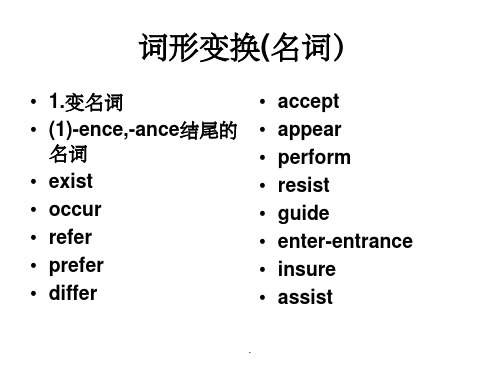
• impress • express • possess • discuss • (爆炸)explode-
explosion • conclude • decide • divide
• confuse
• (扩大)expand
• (延伸)extend
• admit-admission
.
• choose-choice • sell-sale • easy-ease • proud-pride • angry-anger • hungry-hunger • medical-medicine
• fly-flight • behave-behavior • complain-complaint
. • permit
• (3)-ment结尾的名词 • astonishment
• environment
• amazement
• government
• development
• (卷入)involvement • argument
• treatment
• judg(e)ment
• (就业)
• announcement
• (6)-th结尾的名词 • warm • heal • true • dead • bear • grow
.
• (7)-ure结尾的名词 • please • expose • press • fail • mix • sign-signature
• (8)-ce结尾的名词 • important • different • independent • present • absent • violent • convenient
词形变化名词解释

词形变化名词解释
词形变化,也被称为屈折变化或词态变化,是语言学中的一个概念,主要指在语法中,一个词的词形由于它所处的语法环境或时态的不同而发生的形式上的变化。
词形变化通常包括名词、动词、形容词等词类的变化。
1. 名词的词形变化主要表现在复数形式、所有格形式等。
例如,英语中的“cat”变为复数形式是“cats”,“dog”变为所有格形式是“dog’s”。
2. 动词的词形变化则更为复杂,包括时态(如现在时、过去时、将来时)、语态(如主动语态、被动语态)、以及人称和数的变化等。
例如,英语中的“write”变为过去时形式是“wrote”,被动语态形式是“was written”。
3. 形容词的词形变化则可能涉及到比较级和最高级的形式,如“happy”的比较级是“happier”,最高级是“happiest”。
以上只是一些基本的解释,具体的词形变化规则可能会因语言的不同而有所差异。
- 1、下载文档前请自行甄别文档内容的完整性,平台不提供额外的编辑、内容补充、找答案等附加服务。
- 2、"仅部分预览"的文档,不可在线预览部分如存在完整性等问题,可反馈申请退款(可完整预览的文档不适用该条件!)。
- 3、如文档侵犯您的权益,请联系客服反馈,我们会尽快为您处理(人工客服工作时间:9:00-18:30)。
名词的词形变化1.不规则复数形式1)来自古英语的复数形式,如:child---children foot---feet tooth---teethgoose---geese man---men woman---women mouse---mice louse---lice ox---oxenpenny---pence analysis---analyses appendix---appendices parenthesis---parenthes basis---bases ellipsis---ellipsesaxis---axes hypothesis---hypothes oasis---oases cris----crisescriterion---criteria phenomenon---phenomena datum---data medium---media bacterium---bacteria nucleus---nuclei fungus---fungi stimulus---stimuli alumnus---alumni focus---foci radius---radii terminus---terminilarva---larvae alga---algae formula---formulae#当代美国英语中往往把data当做单数用,因此常见到复数形式datas。
另外,lens是一个单数可数名词,其复数形式为lenses。
1)词尾读音为[f]并以-f或0-fe结尾的名词复数形式有以下几种情况:a)规则形式:belief---beliefs chief----chiefs cliff----cliffs grief----griefs b)不规则形式,即把-f或-fe变成-v,再加-es,读音为[vz]:calf---calves half---halves leaf----leaves life----lives loaf---loaves self---shelves thief---thieves wife---wives wolf---wolvesc)既可是规则形式又可是不规则形式:dwarf---dwarfs/dwarves hoof---hoofs/hovesscarf---scarfs/scarves wharf---wharfs/wharves3)词干以-o结尾的名次有三种情况:a)附属形式为-s:这类词包括缩略词kilos,photos;表示国籍或民族的词Filipinos,Eskimos以及radios,solos,sopranos,studiosb)复数形式为-es,如:heroes,potatoes,tomatoes,Negroes。
c)复数有规则的和不规则的两种形式,如:cargo---cargos/cargoes mosquito---mosquitos/mosquitoes volcano---volacbos/volcanoes2.单复数同形的名词1)某些动物名词,如:deer,grouse,salmon,trout,carp,bison,sheep等2)以-ese或-ss结尾的表示民族或国籍的名词,如:Chinses,Japanese,Portuguese,Swiss,Vietnamese等3)某些以-s结尾的名词,如:barracks,corps,crossroads,gallows,headquarters,means,series,species,works等4)某些表示计量单位的名词,如:horsepower,hertz,kilohertz,li,mu等其他一些名词,如:aircraft,spacercarft,craft,offspring等。
其中请特别注意-s结尾的单复数同形的名词,它们是考试的重点!!3.不可数名词不可数名词前一般不需要加定冠词,永远不能加不定冠词!例如下列用法均属错误:the mathematics the banking a cloth an equipment不可数名词作主语,谓语要用单数形式。
如:Water is important.但如果不可数名词前面被piece,drop,set等词修饰时,谓语应该与piece,drop,set等的单复数形式保持一致例如:Few drops of water are need to save the flower.下面是典型的不可数名词,是应该熟记的!!air,smoke,steam,vapor,hydrogen,oxygen,nitrogen,water,oil,soup,juice,ink,rain,s now,ice,tea,coffee,wine,sunlight,sunshine,lightning,thunder,weather,darkness,heat,light,electricity,energy,power,sugar,sal t,rice,corn,powder,flour,sand,dust,dirt,garbage,grass,hair,furniture,luggage,clothing,mail,equipment,food,meat,fruit,br ead,toast,stone,iron,copper,chalk,paper,glass,wood,money,poetry,jewelry,machinery,weaponry,personnel,scenery,happ iness,kindness,honesty,friendship,attention,wisdom,success,courage,bravery,health,wealth,ignorance,trouble,ease,luck,laught er,love,peace,news,information,knowledge,intelligence,fun,pleasure,entertainment,enjoyment,recreation,relaxation,progre ss,room,work,homework,population,percent,mathematics,econmics,statistics,meteorology,anthropology,architecture,physics ,photography,ethics,politics,mechanics,obsterics请特别注意其中以-s结尾的不可数名词,大家平时应该积累遇到的不可数名词!!注意下列可数名词!!poet poem essay newspaper machine weapon scene photograph photographer英语中有许多名词既可作可数,又可作不可数。
如:hair作“人或动物的毛”的时候是可数名词,作头发解释时是不可数名词。
判断一个词是否可数,除了记忆以外,主要看题中该名词的修饰词来决定。
如:much只能修饰不可数名词4.单数形式和复数形式的词义不同的名词英语中有些名词的复数形式的词义不同于单数形式,如:air(空气)---air(气派)arm(手臂)---arms(武器)ash(灰)---ashes(骨灰;废墟)authority(权利)---authorities(当局)cloth(织物)---clothes(衣服)content(含量)---contents(目录)custom(习惯)---customs(海关;关税)damage(损害)---damages(赔偿金)force(力量)---forces(武装部队)glass(玻璃)---glasses(眼镜)good(利益)---goods(货物)green(绿色)---greens(青菜)letter(字母)---letters(文学)manner(方式)---manners(举止,仪态)minute(分钟)---minutes(记录)pain(痛苦)---pains(劳苦)paer(纸)---papers(文件)宿舍)spectacle(光景)---spectacles(眼镜)spirit(精神)---spirits(烈性酒)time(时间)---times(时代)water(水)---waters(水域)wood(木头)---woods(森林)work(工作)---works(工厂)总结1.单数名词不能单独存在,一般前面应该有限定词修饰。
2.不定冠词a/an永远只能修饰单数可数名词。
3.every和each永远只能修饰单数可数名词。
但every+数词+复数名词是正确的,如:every ten years4.序数词后面一般使用单数可数名词。
5.anther永远只修饰单数可数名词但another+数词/few+复数名词是正确的,如:another eight years;another few books6.other通常修饰复数名词,也可修饰不可数名词。
但the other+is/was 单数名词或any other+单数名词是正确的,如We have two girls in this team.One is Mary,the other is Alice.Henry Smith is taller than any other student in his class.7.下列词和短语只能修饰复数名词these,those,many,various,several,numerous,diverse,few,a few,both,a (good/large/great)number of,numbers of,one of8.大于1的词数只能修饰复数名词!!牢记的结构:one/two/many+of+限定词+复数名词!!9.只能修饰单数可数名词的词:one,anther,a/an,this,that,each,every,either,such a,many a!!注意!!many student以及many a student10.只能修饰复数可数名词的词:>1的数字(two,six.....),hundred,thousand,million,both,several,many,few,a few,these,those,a (good/large/great) number ofnumbers of,the numberof,numbers of,numerous,various,diverse,a series of,a wide range of,a collevtion of11.只修饰不可数名词的词:much,little,a litter,a great deal of,a great amount of,a piece of,an article of12.既可修饰不可数又能修饰可数的词:all (of)a lot of some (of) lots of any (of)plenty of most (of)half (of) a wealth of (a) part ofenough (of) the rest of other one third of suchno a variety of。
